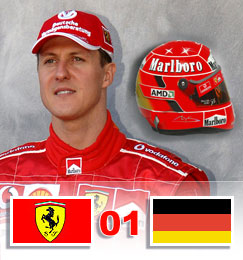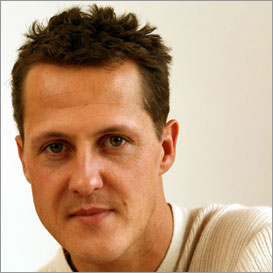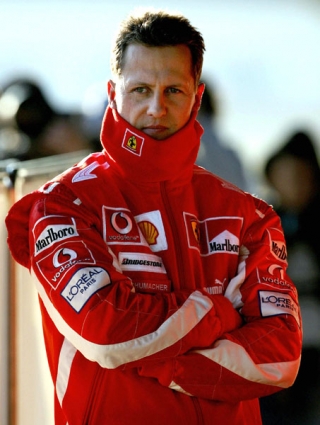After beginning with go-karts, Schumacher won German drivers' championships in Formula König and Formula Three before joining Mercedes in the World Sportscar Championship. After one Mercedes-funded race for the Jordan Formula One team Schumacher signed as a driver for the Benetton Formula One team in 1991. After winning consecutive championships with Benetton in 1994/5, Schumacher moved to Ferrari in 1996 and won another five consecutive drivers' titles with them from 2000–2004. Schumacher retired from Formula One driving in 2006 staying with Ferrari as an advisor. Schumacher agreed to return for Ferrari part-way through 2009, as cover for the badly-injured Felipe Massa, but was prevented by a neck injury. He later signed a 3-year contract to drive for the new Mercedes GP team starting in 2010.
His career has not been without controversy, including being twice involved in collisions in the final race of a season that determined the outcome of the world championship, with Damon Hill in 1994 in Adelaide, and with Jacques Villeneuve in 1997 in Jerez.
Off the track Schumacher is an ambassador for UNESCO and a spokesman for driver safety. He has been involved in numerous humanitarian efforts throughout his life and donated tens of millions of dollars to charity. Michael and his younger brother Ralf Schumacher are the only brothers to win races in Formula One, and they were the first brothers to finish 1st and 2nd in the same race, in Montreal in 2001, and there again (in switched order) in 2003.
Contents
* 1 Early years
* 2 Formula One career
o 2.1 Overview
o 2.2 Debut
o 2.3 Benetton
+ 2.3.1 1994–1995: World Championship years
o 2.4 Ferrari
+ 2.4.1 1996–1999
+ 2.4.2 2000–2004: World Championship years
+ 2.4.3 2005–2006
o 2.5 2007–2009 Retirement
+ 2.5.1 2007: Advisor to Ferrari
+ 2.5.2 2008: Car development
+ 2.5.3 2009: Substitution for injured Massa
o 2.6 Mercedes GP
+ 2.6.1 2010: Return to Formula One
+ 2.6.2 2011
o 2.7 Helmet
* 3 Honours
* 4 Controversy
o 4.1 Championship deciding collisions
o 4.2 Team orders
o 4.3 Dangerous driving
o 4.4 Other incidents
* 5 Family and off-track life
* 6 Racing record
o 6.1 Career summary
o 6.2 Complete Formula One results
o 6.3 Formula One records
* 7 Books and movies
* 8 References and notes
* 9 External links
Early years
Schumacher's title-winning German Formula Three car from 1990
Schumacher was born in Hürth, North Rhine-Westphalia, West Germany, to Rolf Schumacher, a bricklayer, and his wife Elisabeth. When Schumacher was four, his father modified his pedal kart by adding a small motorcycle engine. When Schumacher crashed it into a lamp post in Kerpen, his parents took him to the karting track at Kerpen-Horrem, where he became the youngest member of the karting club. His father soon built him a kart from discarded parts and at the age of six Schumacher won his first club championship. To support his son's racing, Rolf Schumacher took on a second job renting and repairing karts, while his wife worked at the track's canteen. Nevertheless, when Schumacher needed a new engine costing 800 DM, his parents were unable to afford it; Michael was able to continue racing with support from local businessmen.
Regulations in Germany require a driver to be at least 14 years old to obtain a kart license. To get around this, Schumacher obtained a license in Luxembourg at the age of 12.
In 1983, he obtained his German license, a year after he won the German Junior Kart Championship. From 1984 on, Schumacher won many German and European kart championships. He joined Eurokart dealer Adolf Neubert in 1985 and by 1987 he was the German and European kart champion, then he quit school and began working as a mechanic. In 1988 he made his first step into single-seat car racing by participating in the German Formula Ford and Formula König series, winning the latter.
In 1989, Schumacher signed with Willi Weber's WTS Formula Three team. Funded by Weber, he competed in the German Formula 3 series, winning the title in 1990. At the end of 1990, along with his Formula 3 rivals Heinz-Harald Frentzen and Karl Wendlinger, he joined the Mercedes junior racing programme in the World Sports-Prototype Championship. This was unusual for a young driver: most of Schumacher's contemporaries would compete in Formula 3000 on the way to Formula One. However, Weber advised Schumacher that being exposed to professional press conferences and driving powerful cars in long distance races would help his career. In the 1990 World Sportscar Championship season, Schumacher won the season finale at the Autódromo Hermanos Rodríguez in a Sauber–Mercedes C11, and finished fifth in the drivers' championship despite only driving in 3 of the 9 races. He continued with the team in the 1991 World Sportscar Championship season, winning again at the final race of the season at Autopolis in Japan with a Sauber–Mercedes-Benz C291, leading to a ninth place finish in the drivers championship. He also competed at Le Mans during that season, finishing 5th in a car shared with Karl Wendlinger and Fritz Kreutzpointner. In 1991, he competed in one race in the Japanese Formula 3000 Championship, finishing second.
Formula One career
 Michael Schumacher
Michael Schumacher Michael Schumacher
Michael Schumacher Michael Schumacher
Michael Schumacher Michael Schumacher
Michael Schumacher Michael Schumacher
Michael Schumacher Michael Schumacher
Michael Schumacher Michael Schumacher
Michael Schumacher Michael Schumacher
Michael Schumacher Michael Schumacher
Michael Schumacher Michael Schumacher
Michael Schumacher Michael Schumacher
Michael Schumacher Michael Schumacher
Michael Schumacher Michael Schumacher
Michael Schumacher Michael Schumacher
Michael Schumacher Michael Schumacher
Michael Schumacher Michael Schumacher
Michael Schumacher
























No comments:
Post a Comment